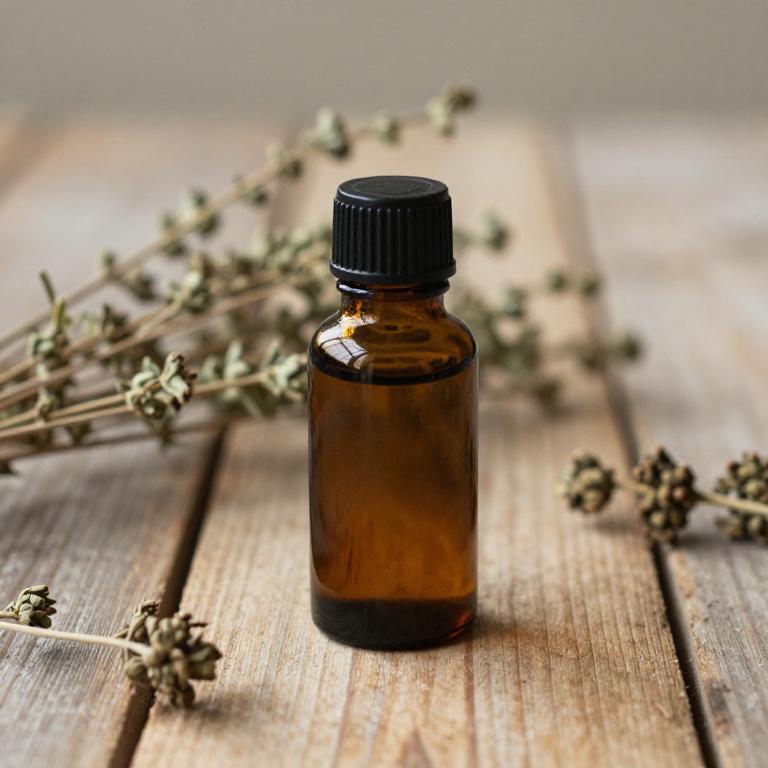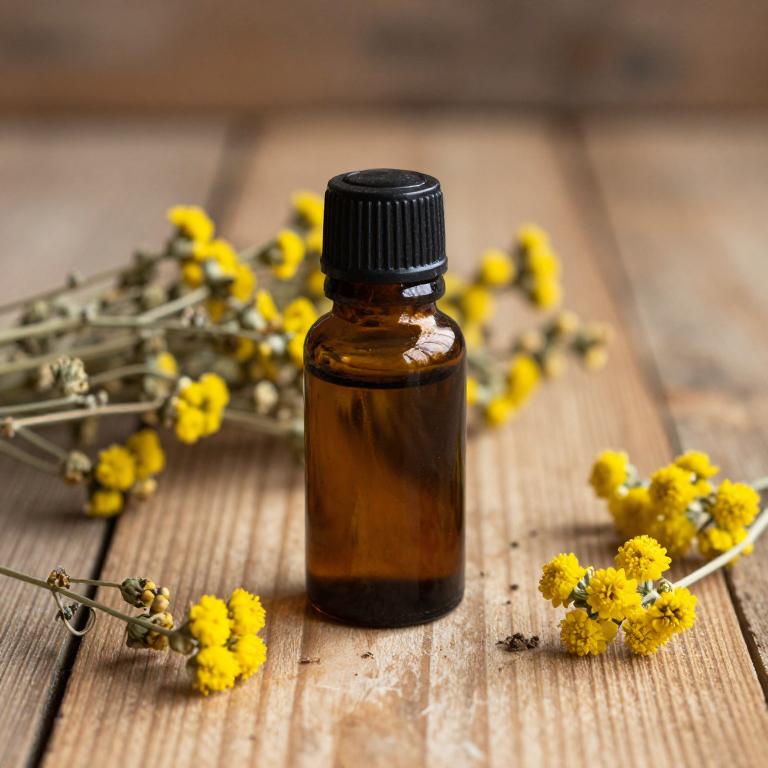10 Best Herbal Essential Oils For Jaw Pain

Herbal essential oils such as peppermint, eucalyptus, and lavender are often used to alleviate jaw pain due to their anti-inflammatory and analgesic properties.
These oils can be applied topically to the jaw area after being diluted with a carrier oil to avoid skin irritation. Peppermint oil, in particular, is known for its cooling effect, which can help reduce muscle tension and ease discomfort. Some individuals use aromatherapy with these oils to promote relaxation and reduce stress-related jaw clenching.
While essential oils may offer natural relief, it is important to consult with a healthcare professional before using them, especially if the jaw pain is chronic or severe.
Table of Contents
- 1. Ginger (Zingiber officinale)
- 2. Black pepper (Piper nigrum)
- 3. Turmeric (Curcuma longa)
- 4. Salvia (Salvia officinalis)
- 5. Rosemary (Rosmarinus officinalis)
- 6. Ceylon cinnamon (Cinnamomum zeylanicum)
- 7. Eucalyptus (Eucalyptus globulus)
- 8. English lavender (Lavandula angustifolia)
- 9. Oregano (Origanum vulgare)
- 10. Lemon balm (Melissa officinalis)
1. Ginger (Zingiber officinale)

Zingiber officinale, commonly known as ginger, is a herb widely recognized for its anti-inflammatory and analgesic properties, making its essential oil a potential natural remedy for jaw pain.
The essential oil is extracted through steam distillation from the rhizome of the plant and contains active compounds such as gingerol and shogaol, which are known to reduce inflammation and alleviate pain. When applied topically to the jaw area, ginger essential oil may help soothe muscle tension and reduce discomfort associated with conditions like temporomandibular joint (TMJ) disorders. However, it is important to dilute the oil with a carrier oil before use to prevent skin irritation.
While some studies suggest its efficacy, more research is needed to fully establish its role in treating jaw pain.
2. Black pepper (Piper nigrum)

Piper nigrum, commonly known as black pepper, contains essential oils that have been explored for their potential therapeutic effects, including relief from jaw pain.
The essential oil derived from black pepper contains compounds like piperine, which possess anti-inflammatory and analgesic properties that may help reduce pain and inflammation in the jaw area. When used topically, diluted black pepper essential oil can provide localized relief by stimulating blood circulation and reducing muscle tension in the jaw. However, it is important to use the oil in a properly diluted form to avoid skin irritation, as it is quite potent.
While some anecdotal evidence supports its use for jaw pain, further clinical studies are needed to confirm its efficacy and safety for this specific application.
3. Turmeric (Curcuma longa)

Curcuma longa, commonly known as turmeric, contains curcumin, a compound with potent anti-inflammatory and antioxidant properties.
Essential oils derived from Curcuma longa have been explored for their potential to alleviate jaw pain, particularly in conditions such as temporomandibular joint disorder (TMJ). These oils may help reduce inflammation and muscle tension in the jaw area when used topically or through aromatherapy techniques. However, it is important to consult a healthcare professional before using these oils, as they may interact with other treatments or cause irritation if not properly diluted.
While preliminary studies show promise, more research is needed to fully understand their efficacy and safety for jaw pain relief.
4. Salvia (Salvia officinalis)

Salvia officinalis, commonly known as sage, contains essential oils that have been traditionally used for their anti-inflammatory and analgesic properties.
These oils, particularly rich in compounds like cineole and thujone, may help reduce inflammation and ease discomfort associated with jaw pain. When applied topically, sage essential oil can provide localized relief by stimulating blood circulation and soothing muscle tension in the jaw area. However, it is important to dilute the oil with a carrier oil before use to prevent skin irritation.
While some individuals may find relief from using sage essential oils for jaw pain, it is advisable to consult a healthcare professional before starting any new treatment regimen.
5. Rosemary (Rosmarinus officinalis)

Rosmarinus officinalis, commonly known as rosemary, produces essential oils that have been traditionally used for their anti-inflammatory and analgesic properties.
These oils contain compounds like 1,8-cineole and camphor, which may help reduce inflammation and alleviate pain in the jaw area. When applied topically, rosemary essential oil can improve circulation and ease muscle tension, making it a potential natural remedy for jaw pain. However, it should always be diluted with a carrier oil to avoid skin irritation.
While it may offer relief for some individuals, it is advisable to consult a healthcare professional before using essential oils for persistent or severe jaw pain.
6. Ceylon cinnamon (Cinnamomum zeylanicum)

Cinnamomum zeylanicum, commonly known as cinnamon bark, contains essential oils that have been traditionally used for their anti-inflammatory and analgesic properties.
These essential oils, rich in compounds like cinnamaldehyde and eugenol, can help reduce inflammation and relieve pain in the jaw area. When applied topically, cinnamon essential oil may provide localized relief for conditions such as temporomandibular joint (TMJ) disorders or jaw muscle tension. However, it is important to dilute the oil with a carrier oil to avoid skin irritation.
While some anecdotal evidence supports its use for jaw pain, further clinical research is needed to confirm its efficacy and safety for this specific application.
7. Eucalyptus (Eucalyptus globulus)

Eucalyptus globulus, commonly known as blue gum eucalyptus, is a widely used herbal essential oil that contains potent compounds such as eucalyptol and cineole, which possess anti-inflammatory and analgesic properties.
When applied topically to the jaw area, it can help reduce swelling and alleviate pain associated with conditions like temporomandibular joint disorder (TMJ) or jaw injuries. However, it is important to dilute the essential oil with a carrier oil to prevent skin irritation and ensure safe application. Some studies suggest that its aromatic compounds may also help relax facial muscles and ease tension headaches that radiate to the jaw.
While it is generally considered safe for topical use, individuals with sensitive skin or allergies should perform a patch test before applying it to the jaw region.
8. English lavender (Lavandula angustifolia)

Lavandula angustifolia, commonly known as English lavender, is widely recognized for its calming and therapeutic properties, including its potential to alleviate jaw pain.
The essential oil extracted from its flowers contains compounds like linalool and linalyl acetate, which have anti-inflammatory and analgesic effects. When applied topically to the jaw area, lavender essential oil can help reduce swelling and discomfort associated with conditions such as temporomandibular joint disorder (TMJ). It is often used in aromatherapy or diluted with a carrier oil for safe application.
Regular use of lavender essential oil may provide natural relief for individuals seeking alternative treatments for jaw pain.
9. Oregano (Origanum vulgare)

Oreganum vulgare, commonly known as oregano, is a herb that has been traditionally used for its medicinal properties, including its potential to alleviate jaw pain.
The essential oils derived from oregano contain high concentrations of compounds like carvacrol and thymol, which possess anti-inflammatory and analgesic effects. These properties may help reduce inflammation and discomfort associated with conditions such as temporomandibular joint (TMJ) disorder or dental pain. When applied topically, oregano essential oil can provide localized relief by targeting the affected area.
However, it is important to dilute the oil properly with a carrier oil to avoid skin irritation and to consult a healthcare professional before use, especially for those with sensitive skin or existing medical conditions.
10. Lemon balm (Melissa officinalis)

Melissa officinalis, commonly known as lemon balm, is a calming herb that has been traditionally used for its soothing properties.
Its essential oil, derived through steam distillation, contains compounds like linalool and camphor, which are known for their anti-inflammatory and analgesic effects. When applied topically to the jaw area, melissa officinalis essential oil can help reduce inflammation and ease muscle tension associated with jaw pain. It is often diluted with a carrier oil before use to prevent skin irritation.
This natural remedy is particularly beneficial for individuals experiencing stress-related jaw pain or temporomandibular joint (TMJ) discomfort.